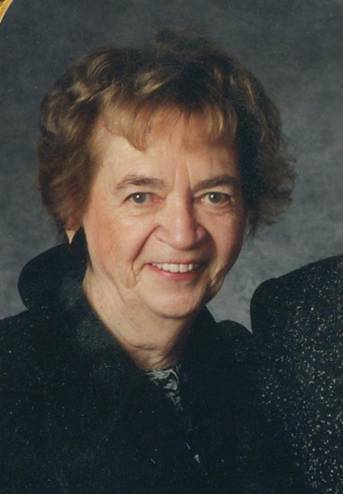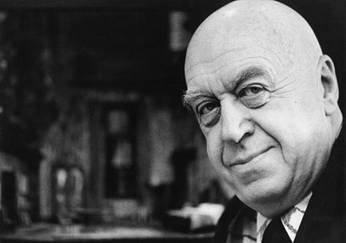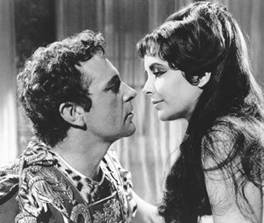|
Judith Crist: Queen
Mother of Critics ‘Love with a Fanatic’s Passion’ By Eve Berliner |
|
|
“The critics who love are the
severe ones. We know our relationship
must be based on honesty.” – Judith Crist |
The director Otto Preminger,
notorious for his tyranny and his temper.
Twentieth Century Fox Elizabeth Taylor and Richard Burton
whose scandalous love affair created a worldwide senation during the making
of Cleopatra. |
|
By Eve Berliner She was the queen mother
of critics, her pen mightier than the sword in those critical years of the 1960’s
and 70’s, in the torrent of the cinematic revolution, her search for truth
fearsome and provocative. There is a fragility to
her now, at age 85, Judith Crist‘s startling blue eyes grown intense and
sentimental with memories of a life in film. It began in the depths
of the great movie palaces of her youth, her inner magical life, entranced
the first time her mother took her to the movies, the moving clouds and stars
in the palace sky, “Judy, Judy, sit down.
You look over here at the
screen,” uttered her mother. Her first real film
memory, vivid to this day, is The Gold
Rush, “Chaplin performing the ballet dance with fork and rolls, eating
his shoelaces as if they were spaghetti, tipping the cabin at the edge of the
precipice!” The rush was indeed unforgettable. She fell in love with
the movies with a fanatic’s passion.
It became her secret life, sneaking nickels and dimes from her
mother’s purse in high school, cutting classes irreverently and joyously at Her early inspirations
were the distinguished critic James Agee who wrote for “The Nation” and Frank
Nugent of The New York Times. The power of the
critic? “Not much. It’s mainly for the edification and delight
of other critics and cinephiles.” She was known as “the
critic most hated by “The most glorious
epithet ever hurled at me appeared in Time Magazine, anonymously: ‘Snide, sarcastic, supercilious bitch!’” Otto Preminger labelled
her “Judas Christ.” New York Post critic
Richard Watts admired “her skill with the stiletto.” And, Judy’s ultimate
favorite, the brilliant director Billy Wilder, who commented that inviting
Crist to review one of your films was “like asking the Boston Strangler for a
neck massage.” The Herald Tribune
years: “The best years of my life.” Began as a feature
writer on the “social significance page” for $27.50 a week in 1945, working
with Helen Reid and her boss, Dorothy Bromley Dunbar, Joe Hertzberg the much revered city editor. Became a general assignment reporter for
eleven years, second-string drama reviewer to the great Walter Kerr, and
finally, editor for the arts. “He is one of my few
Gods who never did diminish. I
worshipped him in every sense.” But the struggle to be
given “a voice,” her own critical voice, at the Herald Tribune took twenty
years of imploring and being told “It’s not the right time for my kind of
criticism.” The fateful turning
point was the protracted 114-day With the resolution of
the newspaper strike, things were in flux at The Trib. Herbert Kupferberg was
appointed editor for the arts. And on Six weeks later, she
became famous [infamous] with her scathing review of Spencer’s
Mountain, starring Henry Fonda and Maureen O’Hara, being shown at Radio
City Music Hall. “A film that for sheer
prurience and perverted morality disguised as piety makes the nudie shows at
the One month later the
storm of Cleopatra detonated, Crist in the center of the
maelstrom, the movie, an
extravaganza of riches, a grossly spectacular epic and the most expensive
film ever made in “At best a major
disappointment, at worst an extravagant exercise in tedium,” wrote Crist. Burton does not appear for the first hour
and twenty minutes, she points out, with another hour and 15 minutes before
their first tepid embrace, Miss Taylor’s “accents and acting style jarring
first with those of [Rex] Harrison and
later with those of Burton. She is an
entirely physical creature, no depth of emotion apparent in her kohl-laden
eyes, no modulation in her voice, which too often rises to fishwife levels.” “With the mystique of
Cleopatra missing, “…Even in their most
dramatic moment, when Cleopatra and Antony are slapping each other around in
her tomb, one’s most immediate image is of Miss Taylor and Mr. Burton having
it out in the Egyptian Wing of the Metropolitan Museum.” “The mountain of
notoriety has produced a mouse.” Crist achieved
“overnight” fame. She won the New
York Newspaper Women’s Club Award for her scorching review. 20th Century Fox cancelled its
ten ticket table and demanded its money back.
Joe Mankiewicz quietly sent a personal check to the Club to compensate
for the loss and over the years became lifelong friends with Judith. They
never spoke of Cleopatra. * *
* “Yes the sixties and the seventies were the
Golden Age, the great filmmakers who emerged and the movie stars in their
prime – and the newcomers. What a
burgeoning – the foreign films and the great filmmakers and the passion. “Woody Allen was reminiscing
in a recent letter to me about a major film festival in which we all wore
buttons that said ‘Fellini’ or ‘Antonioni.’
Woody was an Antonioni man. I
was an ardent Fellini person. “Yes, it was a kind of
golden age. I don’t mean to be in any
way derogatory but there was nothing to compare with some of the animated
movies of today – Ratatouille –sensational,
and Toy Story. From the standpoint of technology it’s
another Golden Age. And the actors of
today: “I go anywhere to see
Viggo Mortensen. I’m an avid admirer
of George Clooney. A belated admirer
of Leonardo DiCaprio. I also like Matt
Damon, Brad Pitt, Tommy Lee Jones, Russell Crowe, a very interesting actor. “I go to the movies once
a week with my kids, my son and his wife.
We geriatric ladies go on weekends to the early morning movie and talk
it all over at brunch.” Judith Crist has
maintained her intuitive affinity for the young – their cauldron of energy
and creativity and dreams of glory –
and drawn joy from it over half a century as an Adjunct Professor of
Journalism at the Columbia School of Journalism. Her students love her. Her favorite all-time class – the class of
1971 [of which David Pitt was a star.] The memorable Judith
Crist Film Weekends held in She gazes at a
photograph of her beloved husband of 45 years, William B. Crist, a public
relations consultant who passed away in 1993, who she only now has come to
realize, bore a strong resemblance to a young Paul Newman. Her son Steven Crist, is chairman of the
board and publisher of The Daily
Racing Form, brave like his mother. We conclude with an
excerpt from Judy’s caustic review of the 1967 Otto Preminger film, Hurry Sundown, which subsequntly won
the New York Newspaper Women’s Club Award for Criticism. “For to say that Hurry Sundown is the worst film of the
still-young year is to belittle it. It
stands with the worst films of any number of years.” The prize was presented
at the banquet by Mayor John V. Lindsay, who was handed a telegram from the
great Preminger which he read aloud to the audience: “Congratulations on your night of triumph
from the man without whom all this would not be possible.” “The last word, as
usual, was his,” laughs Judy. |
|


